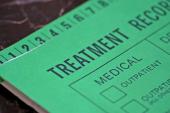‘Stunning’ Cost Variability Across Centers for Common Cardiac Tests, Procedures
The wildly different prices likely reflect stronger negotiating in the boardroom rather than disparate quality of care, one expert said.

Among some of the best hospitals in the United States, the prices of different cardiovascular tests and procedures can vary substantially, sometimes by as much as tenfold, according to a new analysis.
For example, the median price of an echocardiogram can range from $200 at one hospital to more than $2,500 at another, with similar variability seen for stress tests, right-heart catheterizations, PCI, coronary angiography, and pacemaker implantation.
“The variation we found in payer-negotiated prices for identical cardiovascular tests and procedures was quite frankly stunning,” senior investigator Rishi Wadhera, MD (Beth Israel Deaconess Medical Center, Boston, MA), told TCTMD. “For example, across the top 20 US hospitals, there was a tenfold difference in the median price of an echocardiogram, and these differences were even larger for common procedures like PCI and pacemaker implantation. It’s hard to argue that this variation reflects quality of care, given that we looked at a group of top US hospitals.”
Even within the same hospital, said Wadhera, prices could vary depending on the commercial insurance company footing the bill. For example, the price of a nuclear stress test varied fivefold at one center depending on the payer, while the price for a coronary angiogram varied fourfold at another.
The variation we found in payer-negotiated prices for identical cardiovascular tests and procedures was quite frankly stunning. Rishi Wadhera
Published this week in JAMA Internal Medicine, researchers led by Andrew Oseran, MD (Beth Israel Deaconess Medical Center), sought to take advantage of the Center for Medicare & Medicaid Services (CMS) Hospital Price Transparency rule that went into effect January 2021. As Oseran explained to TCTMD, the rule requires hospitals to create a consumer-friendly tool that allows patients to look up projected out-of-pocket costs for common tests and procedures. Additionally, the rule requires hospitals to make payer-specific negotiated prices for every item/service the hospital provides available to the public. Those in favor of the CMS rule say it empowers patients, promotes competition, and provides insurers with added negotiating power to decrease the prices asked by hospitals, said Oseran.
How Much, Exactly, for That Stress Test?
The researchers searched the pricing files of the 20 top-rated hospitals based on rankings from the US News & World Report to assess potential variations in prices for common tests and procedures. The list included such well-known centers as the Cleveland Clinic, Massachusetts General Hospital, Cedars-Sinai Medical Center, Brigham and Women’s Hospital, and NewYork-Presbyterian Hospital, among others.
For an echocardiogram, the median negotiated payer-specific price ranged from $204 to $2,588, while the median price varied from $463 to $3,230 for a nuclear stress test. With a right-heart catheterization, coronary angiogram, and PCI, the prices ranged from $2,821 to $9,382, from $2,868 to $9,203, and from $657 to $25,521, respectively. The price of a pacemaker implantation varied from $506 to $20,002. Self-pay cash prices were also similarly varied across hospitals.
Even within the hospitals, as Wadhera pointed out, there was considerable variability in prices. Depending on the payer, the price of an echocardiogram could range from $470 to $3,022 while a nuclear stress test could cost anywhere from $776 to $3,473. With right-heart catheterization and coronary angiography, the largest interquartile ranges (IQRs) at a single center were $3,143 to $12,926 and $4,011 to $14,486, respectively. With PCI, the largest IQR was $8,474 to $22,694.
To TCTMD, Wadhera said they were equally surprised by the wide variation of prices of tests and procedures within a single center. Commercial insurance companies and hospitals negotiate these prices, but the process is quite opaque, which can lead to different insurers paying different prices within the same system, he said.
We’re hopeful that over time high-quality pricing data will be easily accessible to anyone that wants it. Andrew Oseran
“Our study highlights that this variation in payer-negotiated prices may not necessarily reflect the quality of cardiovascular care a hospital is providing and may instead reflect which stakeholder—hospital or insurance company—has stronger negotiating power in the board room, which is often dictated by market dynamics,” said Wadhera.
Of the top 20 hospitals, 19 posted a machine-readable file listing prices on their website, as required by the CMS rule, but only seven centers reported prices for all cardiovascular tests/procedures. Sixteen of the 20 hospitals posted prices of some but not all of the tests/procedures.
“It’s worth noting that one of the major challenges of research using hospital pricing data is the quality and interpretability of the data that hospitals post,” Oseran told TCTMD. “Specifically, we found that many of the hospitals that we studied provided incomplete data, for example, only posting prices for certain tests or only posting prices for a very small number of payers. And in some cases, hospitals didn’t post any data at all. Other researchers have similarly found that compliance with the price transparency rule has been poor.”
That said, the penalties for noncompliance with the CMS transparency rule have since been increased and researchers and policymakers are paying more and more attention to this issue. “We’re hopeful that over time high-quality pricing data will be easily accessible to anyone that wants it and enable researchers to begin to tackle some of these important policy issues,” said Oseran. He added that the “ultimate goal of this type of work is to better understand the extent to which high prices may be driving the over $350 billion dollars spent on cardiovascular disease care annually, and then to find strategies to reduce that spending.”
Michael O’Riordan is the Managing Editor for TCTMD. He completed his undergraduate degrees at Queen’s University in Kingston, ON, and…
Read Full BioSources
Oseran AS, Ati S, Feldman WB, et al. Assessment of prices for cardiovascular tests and procedures at top-ranked US hospitals. JAMA Intern Med. 2022;Epub ahead of print.
Disclosures
- Oseran and Wadhera report no conflicts of interest.





Comments